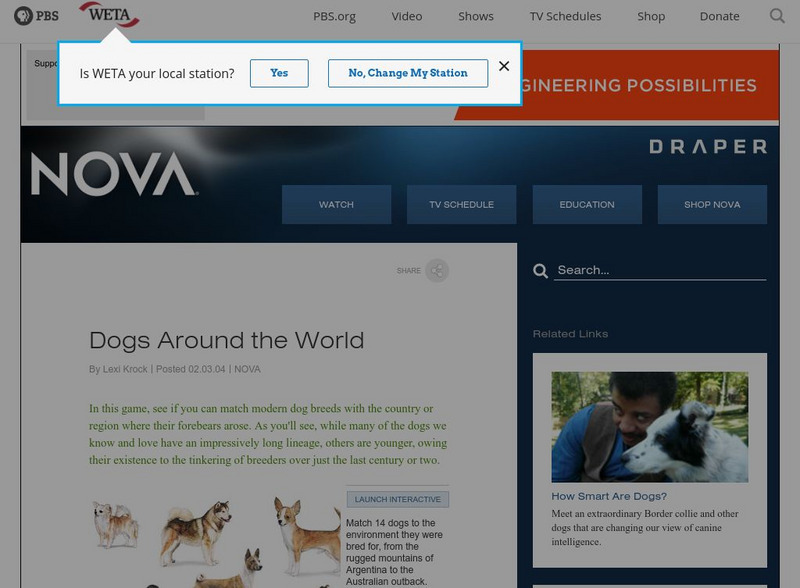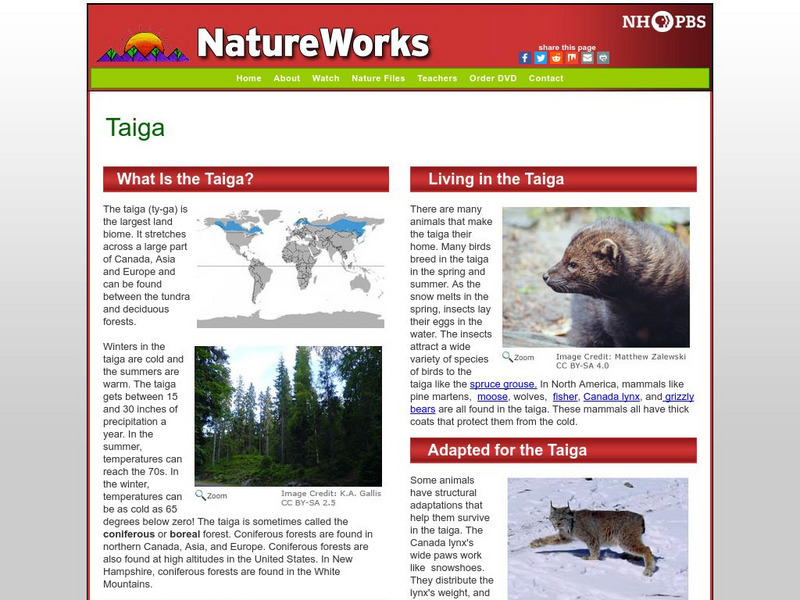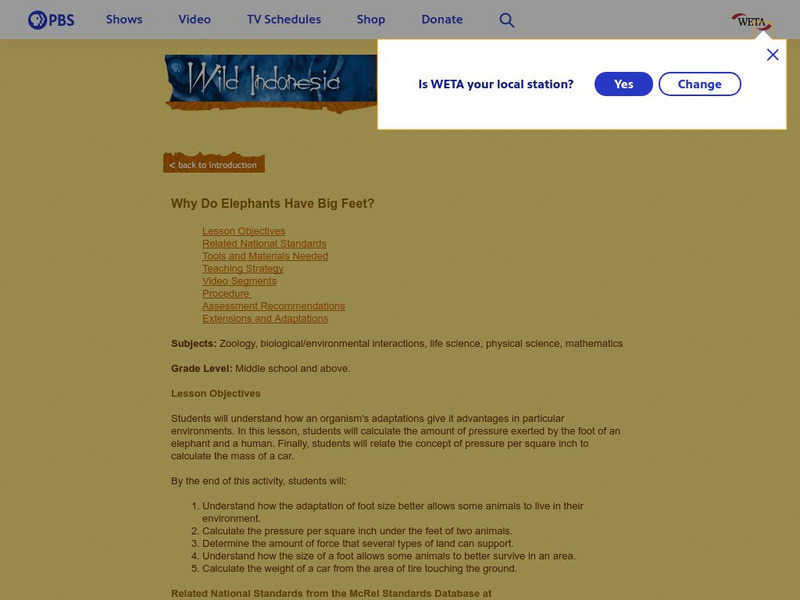PBS
Nova: Dogs Around the World
Play an interactive game where you can match modern dog breeds with the country in which they originated.
University of Washington
Neuroscience for Kids: Animal Senses
Information site provides examples of several animals and their amazing adaptations to their environments.
Scholastic
Scholastic: Study Jams! Science: Animals: Animal Adaptations
A video and a short multiple-choice quiz on the topic of animal adaptations, that look at physical and behavioral adaptations.
The Association of the British Pharmaceutical Industry
Active Science: Humans and Animals: Food [Pdf]
An interactive online game to explore what animals eat.
BioMan Biology
Bio Man Biology: Snurfle Islands
Create a Snurfle and see whether it can survive in different environments. As you play the game, you will learn about natural selection and animal adaptations. At the end of the game, try the multiple-choice quiz to check your...
Other
Nsw Country Areas Program: Grassland
What is a grassland? Learn all about grasslands at this fun and informative site! Content explores the difference between a tropical and a temperate grassland, as well as focusing on the types of animals that live in a grassland.
American Museum of Natural History
American Museum of Natural History: Dinosaurs: Display or Defense?
Are plates of armor, horns, exceptionally large heads, and bony plates examples of dinosaur display or defense? Visitors to this resource will learn what scientists have concluded about the purpose of these peculiar dinosaur features.
CK-12 Foundation
Ck 12: First Grade Science: My Features Can Help Me
[Free Registration/Login may be required to access all resource tools.] Covers the ways that animals' different features can help them survive.
PBS
Nh Pbs: Nature Works: Taiga
Here you can find a great fact sheet on the taiga biome! Learn what the taiga is, where it's located, and the types of plants and animals that live there!
Alabama Learning Exchange
Alex: Now You See Me, Now You Don't!
An animal's physical characteristics, such as its body color, may give it a better chance of survival. For example, the body colors of many animals blend with their background. In this investigation, students will see that body color may...
Alabama Learning Exchange
Alex: Making Tracks
This lesson will allow students to explain or interpret possible scenarios from a single set of observations. Emphasis should be on supporting interpretations with concrete observations.
PBS
Pbs Learning Media: Animal Adaptations: Fishing Cat
Learn how the semi-aquatic fishing cat evolved millions of years ago to live in the wetlands of South and Southeast Asia in this video from NATURE: The Story of Cats (4:18). The accompanying activity prompts students to write an...
PBS
Pbs Teachers: Why Do Elephants Have Big Feet?
Explain how an organism's adaptations give it advantages in particular environments. Calculate and compare the amount of pressure exerted by the foot of an elephant and a human, and apply that knowledge to an understanding of automobile...
Online Learning Haven
Adaptations: Penguins
An interesting look at the structural and behavioral adaptations of the penguin. Neat penguin facts are included at the end of the site.
Online Learning Haven
Adaptations: Sea Turtles
An interesting that examines the structural and behavioral adaptations of the sea turtle. The problems of survival faced by the hatchlings is also delved into in this site.
PBS
Pbs Teachers:mediterranean on the Rocks: Turtle Hospital
Research how people affect animal populations by introducing alien species, which endanger endemic species. Map how the imported red fire ant expanded its range in the U.S. since the 1920s, and investigate the impact this alien has on...
PBS
Pbs Teachers: Scientific American: Science Safari: Ways of the Wild
Explore the problem of wildlife management in many African countries. Apply critical thinking skills to a decision-making scenario and strategically communicate information.
PBS
Pbs Teachers: Scientific American: Wild Places: Identifying Species
Sort and classify insects and spiders by characteristics, using stamps from the United States postal stamp Classic Collection. Create a taxonomic key to distinguish between any four animals.
Other
Teaching Ideas for Primary Teachers: Science Ideas
A great resource to discover fun new activities to use in your classroom. Activities are age-appropriate, and span several science topics.
PBS
Nova: Deep Sea Beastiary
Get descriptions and pictures of numerous deep sea fish. Discover the adaptations that enable them to survive at tremendous depths.
Merriam-Webster
Merriam Webster: Dictionary Illustration: Bird Beaks and Bills
Labeled illustrations demonstrating the diversity of bird mouth parts, each adapted for particular purposes.
Scholastic
Scholastic: Dirtmeister's Science Lab: Animal Adaptations
In this lesson plan site, students will investigate what animal adaptations are and how animals are adapted to where they live. A four-step process guides the students in their investigation.
Online Learning Haven
Online Learning Haven: Animals and Adaptation
This general site defines adaptation and sites examples of some of the best examples of adaptation found in the animal world. Related articles are found at the bottom of this site.
Enchanted Learning
Enchanted Learning: Giraffe Adaptations
Giraffe's have many physical adaptations. This site provides a worksheet and asks students to connect the physical adaptation description to the correct place on the worksheet.





![Active Science: Humans and Animals: Food [Pdf] Interactive Active Science: Humans and Animals: Food [Pdf] Interactive](https://d15y2dacu3jp90.cloudfront.net/images/attachment_defaults/resource/large/FPO-knovation.png)











